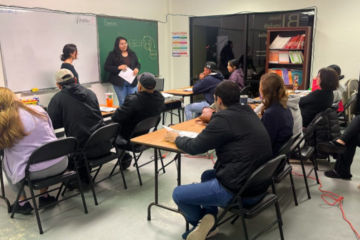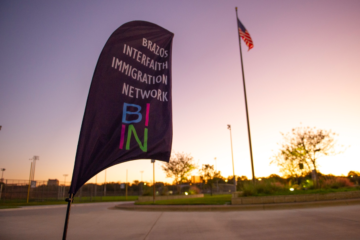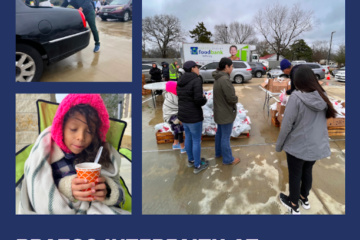IRA Program Continues to Innovate
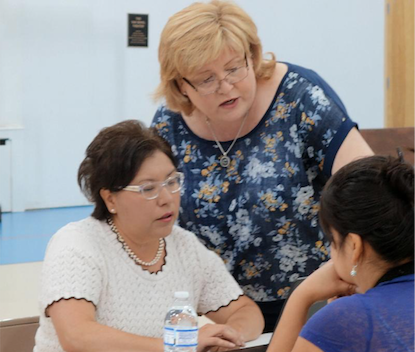
Ten years ago, when BIIN was formed and began as an organization to offer services to immigrants in the Brazos Valley, its “charter” program was IRA: Information, Referral and Assistance. For years, IRA’s trained volunteers have hosted drop-in clinics, where members of the community could stop by, seeking help on a wide range of issues: immigration or legal matters, housing, school registration, help finding a medical provider, recovering wages, or dealing with other common problems that seem insurmountable when you don’t speak the dominant language or understand how local institutions work. The opportunity to get help in a language one understood at a moment’s notice, without appointment or payment, along with the warm welcome and confidentiality offered by IRA volunteers, were among the program’s hallmarks.
Some of these traits did of course change – along with many other taken for granted practices – with the spread of the coronavirus. In March 2020, the BIIN Board made the difficult but well-informed decision to suspend all in-person programs and gatherings. As much as the board and long-time volunteers want to help neighbors in need, the pandemic has forced BIIN (and many other non-profits) to prioritize the health of everyone involved, by finding ways to carry on programs without bringing people face to face.
Like others who carry out BIIN’s mission, the IRA team has adapted to these circumstances. With help from Director Jaimi Washburn, a new procedure was created: interns or staff members check the office voicemail and BIIN’s Facebook in-box daily, and all inquiries destined for IRA are entered into a digital log. From there, IRA Coordinator Raul Dominguez Cruz or long-time volunteer Tony Caraballo are able to make a decision about which member of the IRA team will be assigned to follow up on each case, usually by phone. As much as possible, documents are shared by email and completed online. Adapting its intake procedures in these ways, the IRA team has continued to respond to the steady flow of inquiries that come to BIIN, despite the pandemic.
In a report shared with the BIIN Board at its October meeting, Tony Caraballo provided a detailed overview of the kinds of concerns that continue to bring people to BIIN, in search of assistance. Many requests relate to immigration or legal matters: where to find a lawyer to help with applying for legal permanent residency or citizenship, how to establish a last will and testament, how to work out the terms of custody or finalize a divorce. Others are seeking information or help to accomplish specific tasks, such as opening a bank account, applying for a passport, or getting a health permit for a small business. Some situations lead IRA volunteers to refer clients to small claims court: to recover wages, deal with real estate fraud, or resolve property damage caused by neighbors.
There are also frequent requests for guidance with education: how to register a child for school or a young adult for college, how to obtain financial aid or employment as an international student. Some people seek help setting up a payment plan for bills, finding work, addressing a work-related injury, or locating a medical provider who speaks Spanish. As Tony Caraballo and fellow IRA volunteer Vivian Bronsoler pointed out in presenting the IRA report to the board, the impact of multiple stressors on immigrant households is also evident in the rising number of inquiries related to interpersonal problems. Cases of domestic violence, substance abuse, mental health issues and conflicts within families are not infrequent, as people face economic precariousness, the threats of the pandemic, the challenges of living in tight quarters, and vulnerability to exploitation or family separation.
As Vivian Bronsoler observed, “When a parent reaches out, looking for advice on how to get educational resources for a child with disabilities who is stuck at home, you really understand the depth of this crisis. The kid has been at home with nothing to do since March, and the parents are worried not only about the education lost, but also about being able to pay their bills each month. The stress level is really high, and it is hard for families to find the services they need on their own.”
The IRA team continues to respond promptly and sensitively to every request for help that comes their way. But wondering if the new procedures were keeping some people from requesting help, the team asked the board to authorize a special event in October: a drive-through IRA clinic, where people could come to the parking lot by the BIIN office and consult with an IRA volunteer in person. The board agreed, as long as visitors stayed in their cars, both clients and volunteers wore masks and maintained a distance, and the event was held outside, where air circulation greatly diminishes the risk of transmitting the virus, especially when masks are worn.
The first such “drive-through” event was held on Saturday October 17. Although there were more volunteers than clients, everyone enjoyed being together and discussing ways to keep these vital services going. IRA volunteers hope that with time and continued advertising through local radio and social media, the option of connecting with IRA volunteers safely outside in person will become better known, and will help ensure that neighbors who need help can get it in a timely and efficient manner. This, in turn, will help BIIN maintain trust with the community it serves.
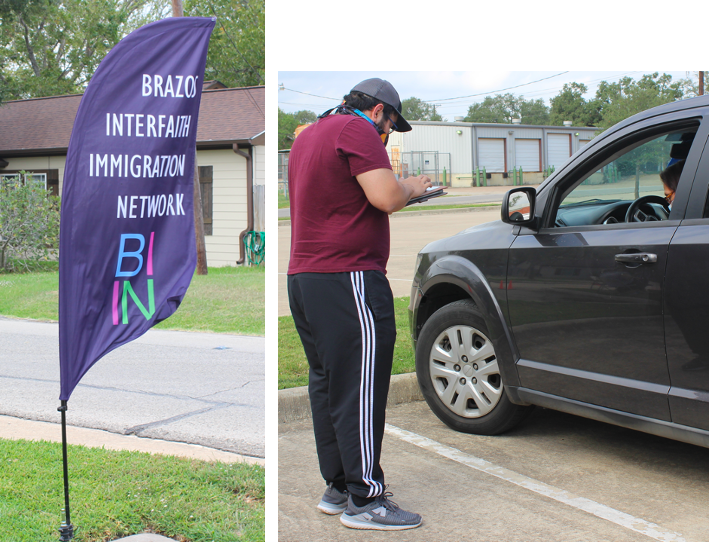
If you are interested in joining the IRA team or supporting BIIN’s efforts to help the most vulnerable of our neighbors in other ways, please reach out to Director Jaimi Washburn at info@brazosimmigration.com.
